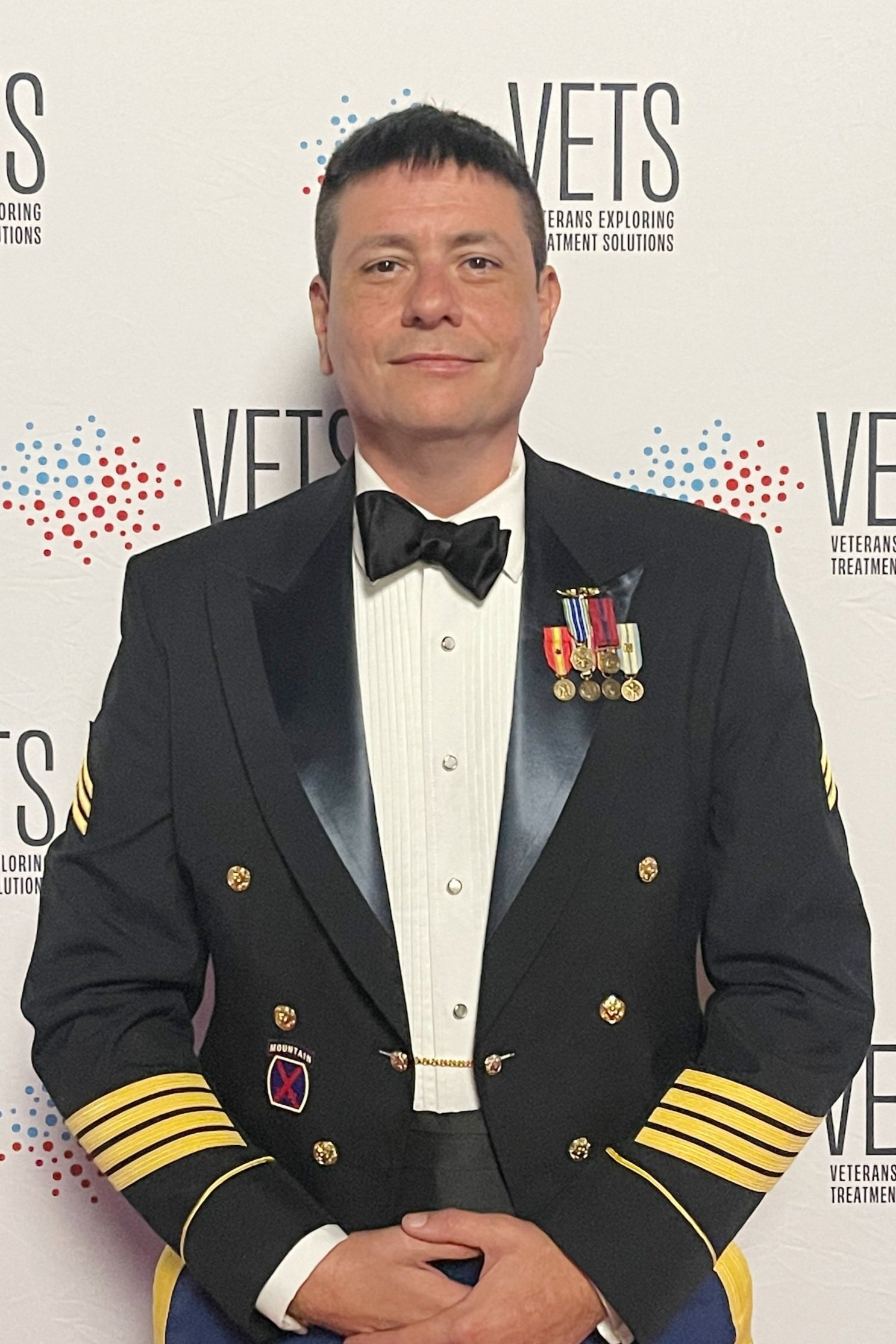The war vet who says the time for psychedelics as a cure for PTSD is now
By Mary L. Dudy and Stephane Fitch
Content warning: This story discusses suicidal feelings. Help is available — speak with someone today at 988.
Jonathan Lubecky is a combat veteran whose time was almost cut short by post-traumatic stress disorder (PTSD) and a traumatic brain injury (TBI). Now he dedicates his life to advocating for the use of psychedelic medicine as a cure for mental health conditions.
Let’s start at the beginning. Did you always know you wanted to be in the military?
Both of my grandfathers served in World War II. I wanted to be in the military since I was knee-high to a grasshopper. So I went into the Marines from 1995 to ’99. When I saw the twin towers come down, I knew I was going back in.
Will you tell us about the injury that led to your PTSD and TBI?
The PTSD didn’t just come from Iraq. It came from childhood trauma outside of my military service and was also tied to how I came back from Iraq.
Can we take a detour so that you can explain that last part?
The weird part about going to Iraq and going to a combat zone is that it feels like it lasts forever. But at the same time, your brain plays a weird trick where it thinks time stops when you get on the plane and starts when you come back. So everything changes while you’re gone, but you have no knowledge of it. And when I got back, my wife was nowhere to be found. She left. Took my dog, sold my motorcycle and left me a light bulb.
Trauma on top of trauma. OK, let’s go back to Iraq.
The TBI came from a night in 2006. I was on a base, [then known as] Anaconda Logistical Support Area, that got mortared so often that it was called Mortaritaville. I had been doing guard duty, so I was exhausted. I shuffled over to the port-a-potty in my flip-flops and Old Navy pajamas with polar bears on them. And the port-a-potty took a direct hit.
How are you still alive?
It’s because I sat down to pee. When the mortar hit the port-a-potty, the shrapnel missed me. If I had been standing up, the shrapnel would have gone through me.
So if the mortar had exploded a few seconds earlier, you’d have died. Did you know what was happening?
I thought, “What the fuck just happened?” My ears were ringing. I jumped to my feet and patted down my body to make sure everything was still there. The only thing that hit me was the blast wave. I got my bell rung!
So you were physically uninjured?
The medic told me that I probably had a concussion. The protocol back then was that if you weren’t bleeding, you went back to work.
And you only realized you had PTSD months later, once you got home?
I knew something was wrong, but I didn’t know what the fuck it was. When you start hearing helicopters that aren’t there, you realize you’ve got a problem. I’d wake up from nightmares. I couldn’t sleep upstairs. So within 60 days of coming home, I made my first of five suicide attempts.
How did you become a spokesman for the Multidisciplinary Association for Psychedelic Studies (MAPS)?
In 2014, during one of my weekly appointments with my psychiatrist at the Veterans Affairs, I had to see an intern. She slid a piece of paper across a desk at me on which she’d written “Google MDMA PTSD.” And I did and learned about MAPS and their clinical research trial using MDMA. Everyone kept talking about how cool MDMA — Ecstasy — was, and I thought, “I might as well try it before I kill myself.” I had zero faith it would work. Nothing had ever worked.
How was the process different from regular therapy?
I love saying that it’s like being in a wetsuit that’s really warm. It’s like being hugged by everyone in the world who loves you while you’re in a bathtub full of puppies licking your face. MDMA is a tool. It puts the mind, body and spirit in the place they need to be to ensure that the therapy can work.
The two of us are fascinated with perceptions of time. It sounds like the drug allowed you to set aside the past and live in the present.
While I was under the influence I had no sense of time. It felt like 15 minutes and 15 hours simultaneously. Time doesn’t really matter when you’re doing this therapy. Now, here’s the really weird part. I remember everything I talked about in my therapy sessions. I cannot tell you which therapy session I talked about them in because, in my head, they’re all kind of one. It’s very strange to have time be both simultaneously compressed and expanded.
How many sessions did you do and how long did they last?
The protocol is three sessions under the influence of MDMA. I did all three. I was initially given a 125-milligram dose, with a 67.5-milligram dose about two hours in. And the purpose of that is not actually to get you higher. It’s to extend the therapeutic range and basically make it last longer so you can get more therapy time. I got about six and a half hours of therapy total before I started coming out of it.
Can you speak a little about what you are doing with your time now?
I’m one of the people pushing the Crenshaw Amendment, which would require the Department of Defense to fund clinical trials on MDMA, psilocybin, ibogaine and dimethyltryptamine (DMT). People who have PTSD should be allowed to be healed and continue to serve rather than being kicked out and shoved over to the VA. I was healed [to manage and live] with PTSD, and I’ve lost a lot of friends to suicide. I have a lot of friends who are currently living with PTSD. It’s why I work as hard as I do.
As a professor of English literature, Mary L. Dudy’s conversations with Shakespeare required her to unwind centuries of scholarly work. As a journalist, Stephane Fitch spent two decades battling clocks ticking down to tight deadlines. Read more about them or this series of interviews about time.




